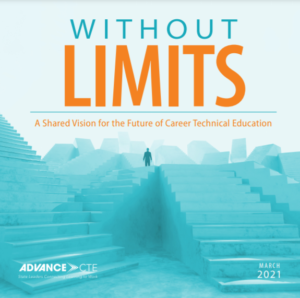 This week, Advance CTE released its third shared-vision, Without Limits: A Shared Vision for the Future of Career Technical Education, which calls for a cohesive, flexible, and responsive career preparation ecosystem that will close equity gaps in educational outcomes and workforce readiness, and leverage CTE as a catalyst for ensuring each learner can reach success in the career of their choice.
This week, Advance CTE released its third shared-vision, Without Limits: A Shared Vision for the Future of Career Technical Education, which calls for a cohesive, flexible, and responsive career preparation ecosystem that will close equity gaps in educational outcomes and workforce readiness, and leverage CTE as a catalyst for ensuring each learner can reach success in the career of their choice.
This vision is supported by 38 national organizations that represent the full continuum of CTE learners and stakeholders. It lays out five inter-connected and equally critical principles:
- Each learner engages in a cohesive, flexible, and responsive career preparation ecosystem
- Each learner feels welcome in, is supported by, and has the means to succeed in the career preparation ecosystem
- Each learner skillfully navigates their own career journey
- Each learner’s skills are counted, valued, and portable
- Each learner can access CTE without borders
To celebrate the release of this new vision, on Thursday, March 18th, Advance CTE hosted a live virtual event, “Without Limits: Reflections on a Shared Vision for the Future of CTE” featuring leaders across workforce, philanthropy, education administration, and higher education to share their perspectives on vision themes and impact.
Advance CTE Executive Director, Kimberly Green, kicked the event off with opening remarks, centering the importance of shared-commitment and shared-ownership to realize the possibility and aspiration of a new career preparation ecosystem, “This vision reminds us of our responsibility as leaders to have courageous conversations, challenge tradition and status quo, and to take the risk of trying to do new things. It takes us working together across systems, across states and across sectors to realize the aspiration and the hope of this vision.”
For the remainder of the event, Sara Allan moderated the panel composed of Dr. Adrienne Battle, Emily Fabiano and Dr. Nicole Smith, focusing on the areas of the vision the speakers were most excited about, work they are doing related to the vision and advice for how to get started. Major themes discussed were the importance of alignment across K-12, postsecondary, workforce and industry sectors, attending to equity, and the need to take an integrated approach to providing opportunities to learners. Emily Fabiano stressed the importance of leadership in driving this vision forward: “We can as leaders bring organizations together – the programs, the data and the priorities – to do the backend work to create those seamless pathways.” Nicole Smith commended the strong focus on equity, sharing “in many ways the shared vision has redefined equity. It includes all dimensions of equity – educational, racial, socio-economic, gender and geographic.”
The speakers also pointed to our country’s current reality. In the past year, the pandemic and economic recession have highlighted existing disparities between who has and does not have access to opportunities. Now more than ever, learners need practical and efficient educational options to successfully enter the rapidly changing workforce. This vision has the potential to do right by learners and provide the opportunities they need to learn career skills that will launch them into a promising future. As Sara Allan noted, “This blueprint for action couldn’t come at a more important moment.”
In closing, Dr. Battle reminded listeners to, “be courageous, be willing to not have all the answers and to know you will fall down before you walk or run. Despite all of that, we have to stay the course. This work will take time, collaboration and investment of time, talent and resources.”
To get started, visit careertech.org/without-limits to read the vision, view the vision supporters and sign on to stay engaged as this ambitious and bold shared-vision is implemented in states, districts and industry sectors across the country.
Special thanks to our 38 national partners for supporting this vision and the Bill & Melinda Gates Foundation and the Strada Education Network for making this event possible.
Christina Koch, Policy Associate
